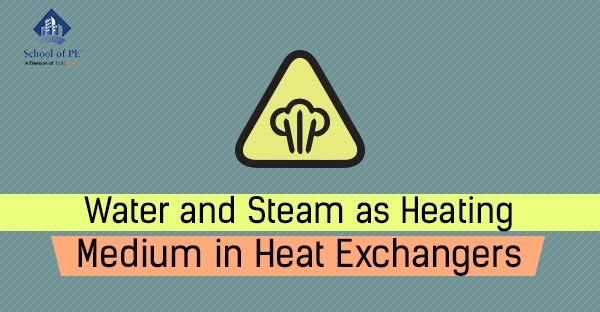Pros and Cons of Using Water and Steam as a Heating Medium in Heat Exchangers
Jan 30, 2017
Although water is abundantly available for commercial use, it contains various minerals that create corrosion and scaling in heat exchangers. The process of scaling adversely affects heat transfer and can lead to equipment failure. Chemical treatment is required to prevent corrosion and scaling deposits. Microbiological fouling is also an important factor when selecting water as a heating medium in heat exchangers. Properties of water and the functionality of heat exchangers are reviewed in PE exam prep courses.

Steam is used as a heating medium in heat exchangers. Pressure steam is classified as low pressure steam and high pressure steam. Low pressure (LP) steam carries more latent heat, is normally of higher quality, reduces scaling, and reduces the fouling factor. LP steam typically requires pressure reducing values, which require more space and require large pipes for condensation. The space requirement and size of the pipes add maintenance and operational costs. High pressure (HP) steam requires smaller pipes and has a lower installation cost than LP steam piping. Professional Mechanical engineers design and create drawings of piping systems prior to installation. Our PE Mechanical exam review course offers a thorough refresher of HVAC principles and topics related to heat exchangers.
1. Water vs. Steam as a Heating Medium
- Water does not change state while it is being used as a heating medium. As it gives up heat energy to the secondary medium, its temperature drops. If one pound of water drops one degree Fahrenheit in temperature, it produces approximately 1 British thermal unit (BTU) of heat.
- Steam also does not change state while it is used as a heating medium, and it gives up heat energy to the secondary medium. During the process, its temperature drops, but the fluid condensate remains at the same temperature. One pound of steam at a pressure of 30 psi gives up approximately 929 BTUs of heat. Steam gives up more energy per unit mass than water.
2. Factors That Influence Heat Transfer Rates
The following factors influence heat transfer rates:
- Surface area
- Temperature
- Flow characteristics
- Fouling/Scaling
- Film coefficient of fluid
- Thermal conductivity of metal
3. How to Find Rate of Heat Transfer
For fluids that change state, the rate of heat transfer "Q" is given by:
Q = W*C* Temperature change of the fluid (△T) + W* Latent heat of vaporization (△H)
W = Flow rate of fluid (kg/hr.)
C = Specific heat of fluid (BTU/kg/degrees C)
△T=Temperature change of the fluid (degrees C)
△H = Latent heat of vaporization (Btu/kg)
For fluids that do not change state, the rate of heat transfer "Q" is given by:
Q = W*C * Temperature change of the fluid (△T)
If the rate of heat transfer is higher, then the heat exchanger's efficiency is higher and vice versa.
The above equations are important for engineers who plan to take the Principles and Practice of Engineering (PE) exam for their career advancement.
Latest Blogs
Blogs by Year/ Month
Copied to clipboard



